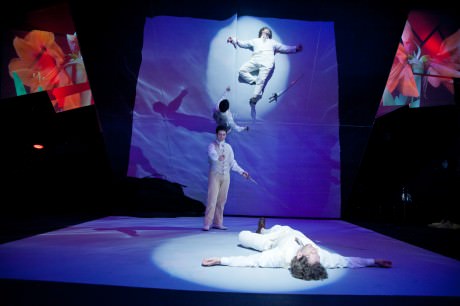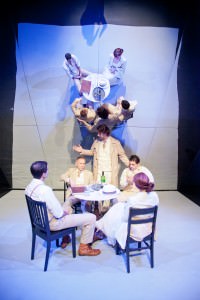“Shakespeare does not need your help,” barks Franz, the jaded, tyrannical director character in WSC Avant Bard’s world premiere of Caesar and Dada. The irony is that repackaging the bard’s trunkful of blueprints is this troupe’s singular obsession.

Sprung literally from the fringes of one of Playwright Allyson Currin’s dreams, Caesar and Dada fuses classic Shakespeare with avant-garde Dadaism, a nihilistic art movement born in Zurich during World War 1, and simply a dream cast. Just as Shakespeare routinely employed actors playing actors in his works, this provocative play follows the Zurich-based, WWI-era Theater of Truth company as it mounts an ambitious production of Julius Caesar itself about ambition run wild. During the war, Switzerland was a scene of diplomacy and neutrality; it makes sense that Currin’s array of colorful international characters has dodged the war’s theater to find refuge in a real theater (an oxymoron?).
Rather, a theater hell-bent on realism, as its German Swiss director Franz (the commanding Sun King Davis) proves a despot, putting the “bore” in collaboration. The company’s ranks include a wounded British war veteran, Alfred, who doubles as set designer (all the world’s a stage and he is tasked with rolling out yet another marble one in a long assembly line of predictable stages leaving a creative genius untapped); his Russian wife, Anna, who fled communism to be vociferously uncommon; Italian heartthrob Dominic, who bows to the power of suggestion; Irish ex-soldier Tristan, the company’s headliner with a big head who also suffers from PTSD; and newcomer Lily Brick, an American beauty who worms her way into everyone’s head as either muse or menace.
As they gather around a café table drinking wine, it serves as an international summit for debating art in political terms. Dominic (Joe Feldman is dynamite!) stands for Symbolism, Alfred (the dignified Mario Baldessari) cleaves to Expressionism, Anna (a robust Megan Dominy) is a passionate pragmatist and Lily … well, Lily, a true class act by acting savant Mundy Spears, is the futuristic American interloper with her “ghostly little face” in milky white who milks others for attention and forces a break in their European traditions, gender-bending the play to win the role of Brutus.
Despite a promise of Dadaism, this work simply drips with symbolism.
Director Lee Mikeska Gardner breathes life into each verse and vessel. The characters take turns slipping from their loosely tethered reality into dreamscape sequences. The pacing is breathtaking; Gardner understands the power in dead air, especially when Tristan (a genial but comparatively green Andrew Ferlo) confesses his war story in the second act.
Co-Director Steven T. Royal Jr.’s ingenious set reflects the topsy-turvy landscape of the characters’ internal battles. It literally reflects it. A jaw-dropping mirrored backdrop in Act I squinches the stage while expanding viewpoints, mirroring the play’s dance between foresight and hindsight. One might think mirrors are the ultimate realistic device, yet these deceive not only by playing tricks with perception but by reminding us that an actor’s directions are the opposite of what we see – stage left is our right, upstage feels down, etc. It also drills home the idea that we sublimate ourselves for a role despite a leaden vanity — our burden as humans.

Projections designed by Tewodross Melchishua – including a video villain in god-devil vein and a hilarious PowerPoint presentation on the artistic treatises of a bunny – accentuate the nonsensical, fractured logic. Combined with Lynly Saunders’ clever costumes – she creates a patchwork of styles in blank-canvas tones to stress both Neutrality and Individualism – the actors themselves serve as canvases for chilling projections. Spears’ hair design is out-of-this-world funky, another piece of a jumbled puzzle that echoes the timelessness of art, theater and power struggles, i.e. war, which never goes out of style. Lighting Director Colin Dieck adds flair; Sound Director Kenny Neal, the boom-boom.
The script is riddled with “inside” theater jokes and rhetoric that can border on tedium. But Feldman’s zingy delivery of the wordplay and swordplay (whimsical choreography by Robb Hunter) help save the day, and there are plenty of quotable, resonant lines (Tristan’s “I made a wish on a star that was a bomb” produced an audible audience swoon). Dialect-wise, coach Melissa Flaim had her work cut out for her — only Feldman and Dominy fully master their foreign tongues, while Ferlo’s brogue turns on and off like a faucet. It took nearly the entire first act to place his nationality – although perhaps there is some genius in paying homage to an Irish restlessness that, in the years immediately following WWI, would erupt in revolution and unbridled nationalism.
At one point the rank-and-file actor characters caucus about how to put their director in line, evoking the conspiratorial senators in Shakespeare’s Julius Caesar – what can be done? How to rein in this madness? It’s a dress rehearsal for violence. And when Davis’ Franz barges into the audience to direct the quintessential speech by Marc Antony, played by Tristan, played by Ferlo, the lines and words and syllables dissipate like vapor, suddenly devoid of meaning. We have reached critical Dada.
Currin definitely packs a lot in. The stuff of dreams? This is the stuff of shivering nightmares. Ultimately, Currin’s truth-seeking missile hits us all where we sit. And though Caesar and Dada might benefit still from a slimmed-down 13th draft, the last line is guaranteed to leave you speechless.
Running Time: Two hours and 15 minutes, including a 10-minute intermission.
Caesar and Dada plays through July 14, 2013, at WSC Avant Bard at Catholic University of America’s Callan Theatre – 3801 Harewood Road, NE, in Washington, DC. For tickets, call the box office at 703) 418-4808, purchase them online, or make reservations by e-mail: [email protected].





